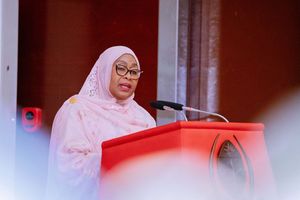Prime
Vodacom Tanzania faces Sh10 billion suit over data privacy

What you need to know:
- A businessman claims that Vodacom shared his personal particulars with ChatGPT, but the firm has raised a preliminary objection and wants the case to be struck out with costs
Dar es Salaam. A Shinyanga-based businessman is suing Vodacom Tanzania Plc for Sh10 billion, alleging that the telco giant shared his personal data with an artificial intelligence (AI) chatbot without consent.
In a landmark case filed in the High Court in Shinyanga, Mr Sayida Masanja wants the company to pay him the amount for the “substantial loss of privacy” caused by the alleged failure to protect his personal data.
He claims the company, which boasts over 17 million customers, purposely facilitated and allowed third-party unauthorised access to his data and proprietary network information.
The businessman claims that sometime in February and March this year, he discovered his personal data on ChatGPT, an artificial intelligence generative chatbot that is capable of mimicking human-like intelligence in a more personalised and conversational way.
The alleged shared information includes incoming and outgoing calls, IMEI, IMSI, his SIM identity and Personally Identifiable Information (PIIs). He also accuses the company of sharing his various locations.
He has gathered printouts of the alleged shared information to form part of his evidence in court
Vodacom denies the claims
Vodacom has shrugged off the claims. The company has raised a preliminary objection and asked the court to dismiss the suit with costs for being incompetent because it has been filed in the High Court instead of the resident magistrate or district courts, in contravention of Section 13 of the Civil Procedure Code.
The section of the law directs that every suit should be instituted in the court of the lowest grade competent to try it, citing a resident magistrate court and a district court.
"It is denied that the plaintiff is entitled to the amount claimed. The defendant operates with the greatest care and a high standard of professionalism in handling the personal data of the customer’s information against third-party invasion," says Vodacom in a statement of defence.
Through the service of Dentons EALC East African Law Chambers, Vodacom insisted it was not responsible for facilitating the access of a third party or any other unauthorized person to the plaintiff’s information.
It has also denied being associated with ChatGPT or assisting the Artificial Intelligence in any manner.
"The defendant disputes having disclosed or shared plaintiff’s personal data in any manner that is in contravention of the contractual or legal obligation for data protection," says Vodacom.
The case, presided over by Judge Ruth Massam, will come up on September 13 for the hearing of the preliminary objections.
Represented by Kaunda and Company Advocates, Mr Masanja claims the disclosure has caused him substantial distress due to the sensitive personal nature of the information.
"The defendant (Vodacom) negligently and without justification facilitated the disclosure of personal data of the plaintiff amounting to 65 records which reveal his private information and other endless inferences and conclusions which a reasonable person can make by merely connecting the dots of such disclosed data," argues the plaintiff through his lawyer, Mr Paul Kaunda.
He also claims that the mapping and disclosure of his mobile phone’s location over the course of 30 days provided an all-encompassing record of his whereabouts.
"The time-stamped data can provide an intimate window into the plaintiff’s life, revealing not only his particular movements but, through them, his familial, political, professional, religious, and sexual associations. Through them, one can connect the dots and arrive at a plausible conclusion about the plaintiff’s lifestyle," he alleged.
He claims to understand that one of the partner organizations that Vodacom shares data with is OpenAI, so that they can use the data to further train and retrain Large Language Models to perfect ChatGPT.
Vodacom has disputed any partnership with OpenAI in the manner alleged by Mr Masanja. "The defendant states that it is not involved in or facilitated ChatGPT in the manner alleged by Masanja," reads Vodacom's statement of defence.
Director of external affairs and Vodocaom Tanzania Foundation at Vodacom Tanzania, Ms Zuweina Farah, said the company was still trying to look for evidence of what happened. "Our legal team is working on this matter diligently,” she said.




